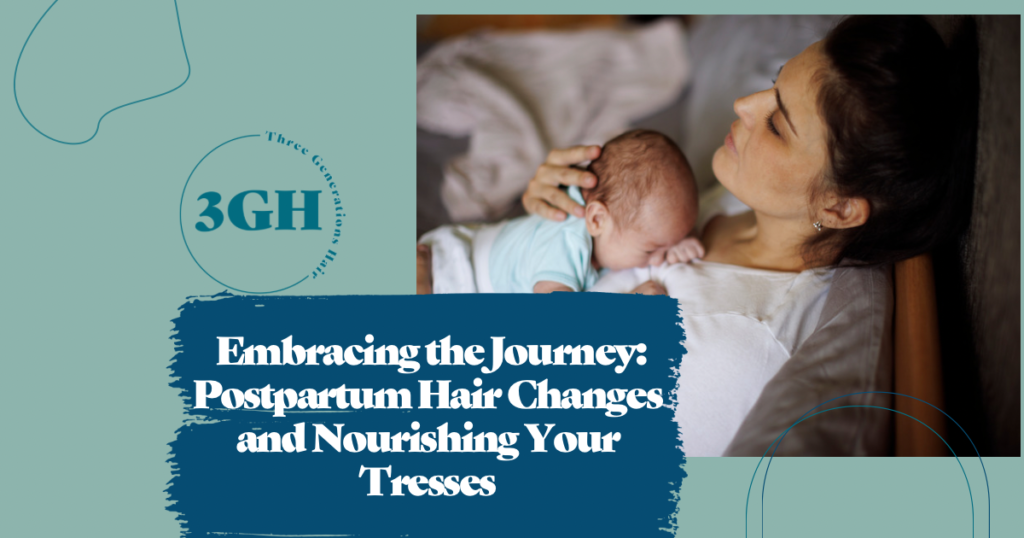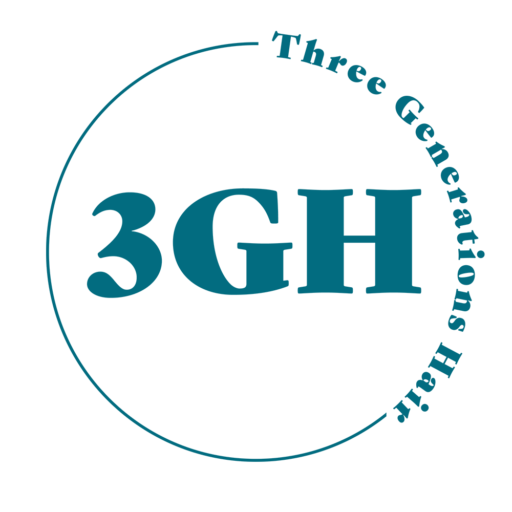
Pregnancy is an extraordinary journey, filled with unique stories waiting to be told. As a mother of two and a hairdresser with over 17 years of experience working with expectant mothers, I have gained valuable knowledge about postpartum hair. During countless conversations with my clients, one topic stood out as the most significant: hair loss. Witnessing their distress at losing hair after experiencing its abundance during pregnancy truly touched me. The truth is, pregnancy triggers a lot of hormonal changes in the body that inevitably impact the hair. Consequently, it is only natural for women to change their hair during and after pregnancy. Inspired by these conversations, I felt compelled to share my knowledge in this blog, hoping to reach more individuals who can benefit from this information.
Postpartum Hair Loss
Let’s talk about postpartum hair loss and why it is happening. Postpartum hair loss is also known as postpartum shedding. Throughout pregnancy, elevated hormone levels extend the hair’s growth phase, resulting in thicker, fuller locks. However, once hormone levels return to normal after childbirth, the hair transitions into a resting phase, causing increased shedding of hair strands. It’s worth noting that this shedding phase usually begins around three to six months after giving birth. I believe sometimes it makes it difficult to connect the hair loss to the pregnancy itself, as significant time has passed.
Fortunately, postpartum hair loss is typically temporary. Once the body adjusts to its pre-pregnancy state, the hair gradually regains its normal growth pattern. In the meantime, it is crucial to focus on maintaining a healthy diet and practicing good hair care habits. Nourishing your body with a balanced diet rich in vitamins and minerals can support overall hair health. I firmly believe that true beauty starts from within. The choices we make regarding our diet and lifestyle directly impact our external appearance. We can’t have shiny hair and beautiful skin if we are not eating a healthy diet to nourish it.
Patience is key during this period, as it may take some time for your hair to fully recover. By incorporating healthy habits and taking care of your overall well-being, you can confidently look forward to the return of your beautiful hair.
What is the best way to deal with postpartum hair loss?
This question is often asked by many women I have encountered, and I understand the challenges they face during this phase. I would like to share the advice I have given to my clients and friends that has proven effective.
First and foremost, it is crucial to be patient and kind to yourself. Remember, you have just brought a beautiful new life into the world. This is a precious time for bonding with your baby, and dedicating yourself to this connection can help relieve stress. It’s important to acknowledge that stress can directly impact hair loss because stress affects our hormones. Finding ways to achieve balance and reduce stress levels is key. While easier said than done, making an effort to prioritize self-care and stress management can positively influence your hair loss experience.
Are there things you can do to help with your postpartum hair loss? Yes! A well-balanced diet and staying hydrating will give you the most results. It sounds super simple, but why complicate it when this actually works? I will go over what vitamins that helps with hair loss next.
Vitamins
Several vitamins and nutrients play a crucial role in promoting hair health and can be beneficial in managing postpartum hair loss. While the best way to obtain these vitamins is through a well-rounded diet, it is advisable to consult with your doctor for personalized supplement recommendations. Here are some essential vitamins that can support hair growth:
Biotin (Vitamin B7): Biotin is often associated with hair health and can support hair growth and strength. It is commonly found in foods like eggs, nuts, seeds, and sweet potatoes.
Vitamin D: Adequate vitamin D levels are important for overall health, including hair health. Natural sources of vitamin D include sunlight, fatty fish (such as salmon and mackerel), and fortified dairy products. Personally, I take Vitamin D3 and I have even seen big changes in the thickness of my hair.
Iron: Iron deficiency can contribute to hair loss. Including iron-rich foods in your diet, such as lean meats, beans, fortified cereals, and dark leafy greens, can help support iron levels.
Vitamin E: Vitamin E is an antioxidant that helps protect cells, including hair follicles, from oxidative stress. It is found in foods like almonds, sunflower seeds, spinach, and avocados.
Omega-3 fatty acids: Omega-3 fatty acids are essential for healthy hair and can be found in fatty fish (such as salmon and sardines), walnuts, flaxseeds, and chia seeds.
I personally take Biotin, Vitamin D3, and powder collagen. I have seen the most results from consistently taking collagen and just sprinkling some in my coffee. Here is my personal favorite . Also, you can read more about here collagen and if it is beneficial for your hair.
Should I still take prenatal vitamins even if I am not pregnant anymore?
Should I continue taking prenatal vitamins even after pregnancy? This is a question many women have encountered, and the answer lies in understanding the potential benefits of these vitamins for hair health. While prenatal vitamins are specifically formulated to meet the unique nutritional needs of pregnant women, they can still have positive effects on your hair even if you are no longer pregnant.
Prenatal vitamins often contain essential nutrients like biotin, iron, and vitamin E, which are known to promote hair health and growth. These nutrients play a vital role in nourishing the hair follicles and supporting optimal hair growth. Therefore, continuing to take prenatal vitamins after pregnancy can potentially provide your hair with the necessary nutrients it needs.
However, it’s important to note that individual results may vary, and the effectiveness of prenatal vitamins for hair health may depend on various factors. To determine the most suitable supplements for your specific needs, it is advisable to consult with a healthcare professional or a registered dietitian. They can provide personalized guidance and recommend the right supplements based on your overall health and dietary requirements.
While prenatal vitamins can be beneficial, it is equally crucial to focus on maintaining a well-rounded and nutritious diet. A balanced diet that includes a variety of foods rich in vitamins, minerals, and proteins can also contribute to optimal hair health from within. So, while prenatal vitamins can support hair health, it is essential to prioritize a comprehensive approach that combines a healthy diet with the appropriate supplements. Ultimately, the key is to provide your body with the necessary nutrients and support it needs for healthy hair.
How to take care of postpartum hair?
Taking care of postpartum hair is essential to maintain its health and promote growth. Establishing a good hair care routine is key, similar to how you would have a skincare routine. There are simple steps that will greatly benefit your hair’s health and appearance.
One crucial step is to prioritize a hair mask treatment once a week. This deep conditioning treatment provides nourishment, hydration, and strength to your hair, promoting its overall health and vitality. You can make your own or purchase one.
Additionally, consider putting your hair in a high loose bun when preparing for bed. This helps minimize friction and tangling, reducing the risk of breakage and ensuring your hair remains protected while you sleep. Believe it or not, that is one of my client’s favorites because they saw a huge change in less hair breakage. Once again simple changes but big results.
Another important aspect of postpartum hair care is sun protection. The sun’s powerful UV rays can negatively impact your hair, particularly the more delicate top layers. Therefore, it’s crucial to shield your hair from harmful sun exposure. Wearing a hat or using hair products with UV filters can help protect your hair from dryness, damage, and color fading caused by excessive sun exposure.
If you find yourself needing to style your hair with high-heat styling tools such as curling irons or flat irons, take precautions to minimize heat damage. Before styling, apply a heat-protecting spray or serum to create a barrier between your hair and the heat. Additionally, using lower heat settings and reducing the frequency of heat styling can help prevent excessive damage and maintain the health of your postpartum hair.
If you like 6 hair care tips after pregnancy you can find them here.
Conclusion:
The postpartum hair journey is an extraordinary chapter in a woman’s life, symbolizing the incredible transformation her body undergoes during and after pregnancy. Embracing the changes and appreciating the resilience of your body are essential steps in navigating this unique hair journey.
During pregnancy, hormonal fluctuations, particularly elevated levels of estrogen and progesterone, contribute to noticeable improvements in hair quality. Many women experience increased thickness, enhanced shine, and reduced hair shedding due to the prolonged growth phase (anagen) of the hair cycle, influenced by these hormones.
However, as the saying goes, “What goes up must come down.” After giving birth, a new mother’s hormone levels rapidly normalize, often leading to postpartum hair shedding. This shedding phase, although disheartening, is a natural and temporary process. The abrupt drop in estrogen levels triggers the hair follicles to enter a resting phase (telogen), resulting in increased shedding. Rest assured, this phase usually lasts for a few months and is followed by regrowth.
Understanding the normalcy of postpartum hair changes can alleviate concerns and empower new mothers to embrace their hair journey. By acknowledging that postpartum shedding is a temporary phase and an inherent part of the body’s recovery process, women can find comfort in knowing that their hair will regain its vitality over time.
Celebrate the strength and beauty of your body as it adapts to motherhood. Practice self-kindness and nourish your hair from within. Implement gentle hair care practices to support its health during this remarkable journey.

